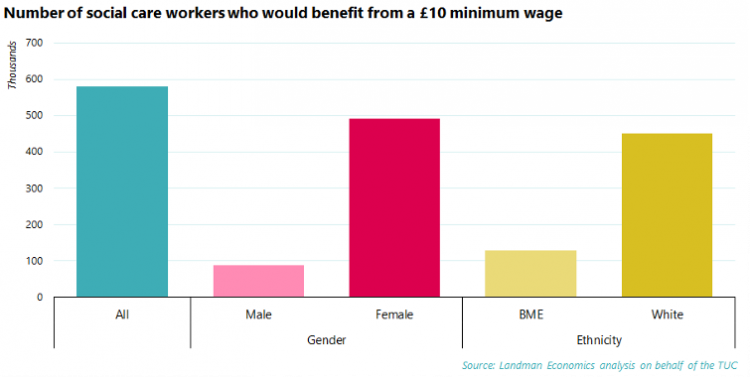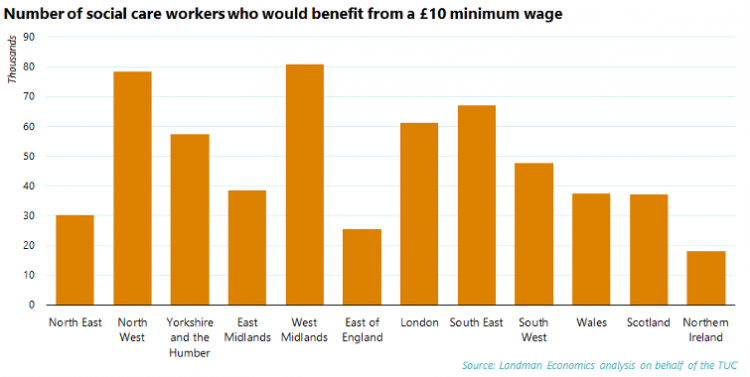A cap on care costs is not reform – we need a new deal for the workforce
The need to reform our social care system is not a new problem. The Covid-19 pandemic has shone a spotlight onto the system and reminded us all how important it is to the fabric of our society.
It’s right that any government should want to fix the problems in social care. That’s why one year ago at our annual Congress, we set out our key demands to do just that.
The government are prioritising the cap on care costs but this alone won’t deliver high-quality care and high-quality employment for those providing it. Increasing tax hits lower-paid workers harder.
It is clear to everyone that social care needs new funding. But how that funding is spent, and who pays for it, matters too. What we can see from today’s announcement, is not enough money will go to social care and towards fixing the challenges that are obvious to everyone.
A new deal for the workforce
Analysis from the TUC shows that fixing one of the biggest problems in social care is possible - ending low pay. Seven out of ten care workers are paid less than £10 per hour.
Over half a million (580,000) social care workers would gain from a rise in pay to £10 per hour. Eighty-five percent of those who would gain are women, an important pay boost in a sector with an overwhelmingly majority female workforce. And it would go some way to tackling the challenges with recruitment and retention fuelled by low pay.

Such a raise would benefit workers in all regions and nations across the UK, with 81,000 workers in the West Midlands, 78,000 in the North West and 67,000 in the South East amongst the highest.
With TUC analysis of Labour Force Survey data showing that 'Care workers and home carers' is the largest occupation group in the UK, and is the largest in the majority of regions and nations, it would have an important economic impact on regions and the country as a whole.

And a pay rise for all care workers is affordable.
The net cost to the Treasury after increased taxes and lowered benefit spending would be £227 million.
Just the other week we showed how it takes a care worker in the private sector 12 weeks to earn what the average director at some of the biggest care providers takes home in one day. Any money going into social care has to come with a commitment to raising pay.
Longer term, the government should strengthen rules to prevent financial extraction in the care sector. Phasing out the for-profit model of delivery would mean investment is focused on delivering high-quality care and fair terms and conditions for staff.
A fairer way to pay for it
It’s right that we should end the financial risk to individuals if you need social care in your lifetime with a cap on the cost of care. Everyone in society should make a fair contribution to give us the social care system we deserve.
But the changes announced today disproportionately impact the pay packets of those on the lowest pay. It’s just not right that the only change a care worker will see from these proposals is an increase on their tax bill.
Instead we should look to the way we tax wealth – far more generously than we do income.
Increasing tax on dividends is a welcome first step to reforming the way we tax wealth, but it won’t generate the revenue needed to deliver a social care system this country deserves.
If the government starts to tax wealth fairly by raising capital gains tax to the same rate as income tax we could raise enough money – up to £17 billion – to give workers the pay rise needed and ensure we can deliver high-quality care to all who need it.
It’s affordable – and the right thing to do
Spending on social care shouldn’t be seen as taxation and costs. Instead, it is an investment. Social care is worth £46.2 billion to the economy and represents 6 per cent of total workforce employment.
By investing, government could have made sure those who rely on social care get the quality of care they deserve. They could have made up for the £600m shortfall in social care funding to local authorities since 2010, helping the millions of people with unmet care needs.
A new sectoral minimum wage would help fill the 122,000 vacancies and reduce turnover in the workforce. This would have given care workers the pay rise they need and deserve, a policy supported by 4 out of 5 workers in recent polling.
Today’s announcement for social care is a promise of money tomorrow.
The funding needed today will not come the way of social care for years to come, and much needed reforms will only be looked at in a long-awaited White Paper. This means that the challenges of the previous years will remain unaddressed.
Those relying on social care and those who deliver it have been left waiting some more.
And many care workers will be saying today, that a ‘plan for social care’ that does nothing for their pay is not much of a plan at all.
Stay Updated
Want to hear about our latest news and blogs?
Sign up now to get it straight to your inbox
